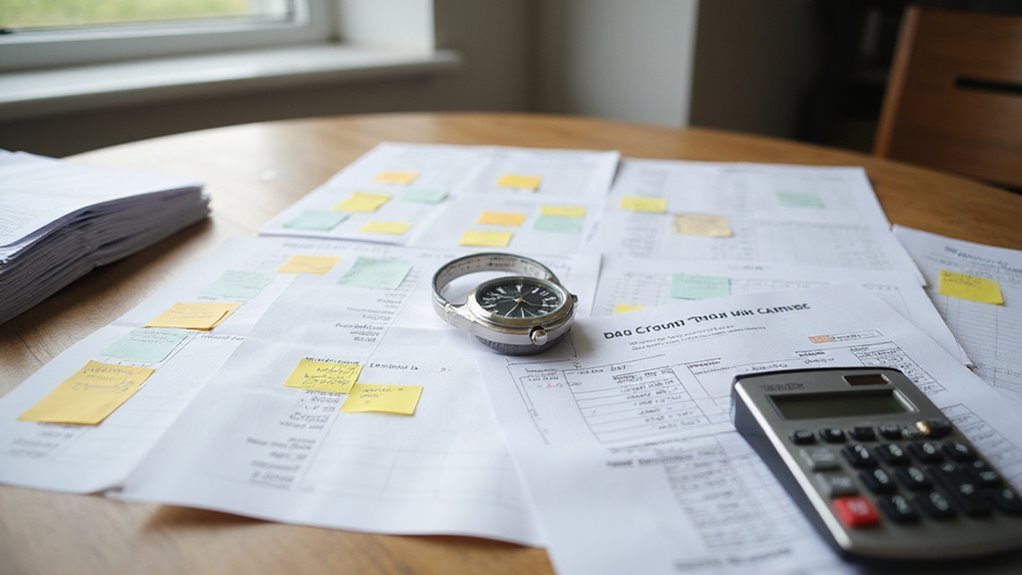


Many people struggle with poor credit and want to fix it fast. Bad credit can make it hard to get loans or good interest rates. Credit problems can feel overwhelming and confusing when you do not know where to start.
These credit issues can hold you back from important goals. You may feel frustrated when your score does not improve right away. Waiting for change can make it seem like your efforts are not working.
It usually takes three to six months to see real improvements in your credit score, though some fixes may take longer. You need to review your credit report, fix errors, and pay bills on time to see progress. This blog will guide you through each step and help you repair your credit with clear, simple advice.

Your credit report shows details about your credit history and debts. Get your credit report from Equifax, Experian, and TransUnion. Read each report closely. Check for mistakes or accounts you do not recognize. Look at late payments, unpaid debts, and hard inquiries. If you find errors, contact the credit bureau and the creditor to dispute them. Make sure your name, address, and Social Security number are correct.
Each bureau may report information differently. If you spot differences, your score may be lower. Understanding your credit report helps you fix problems and improve your credit faster. Regularly monitoring your credit report is key to catching data inaccuracies and protecting your financial health. Reviewing your report regularly can help you quickly spot signs of fraud or reporting errors that may hurt your credit.
You’ll find that the time it takes to repair your credit depends on several key factors, including how serious your credit problems are and the kinds of negative marks on your report. Each reporting agency also has its own timeline for updating and correcting information, which can speed up or slow down your progress. To make real improvements, you need to understand these elements and address them directly in your credit repair plan.
If your credit issues are related to identity theft or fraud, using fraud alerts can help provide protection while you work to restore your credit. You can also track your progress using credit utilization rate data, since lowering your utilization is a key part of most credit repair strategies.
The seriousness of your credit problems affects how long repair will take. Minor issues, like a few late payments, often resolve faster. Major problems, such as charge-offs or bankruptcy, need more time and effort. Review your full credit report to find any severe issues.
If you have large debts or missed payments, consider credit counseling. A counselor can help you plan, negotiate with creditors, and manage payments. Quick and steady actions are important for progress. Severe credit problems require patience and a clear plan to fix.
Negative marks on your credit report are different types of bad records. Each type affects your credit in its own way. Late payments, collections, charge-offs, bankruptcies, and foreclosures all show up as negative marks. Late payments usually stay for seven years.
Bankruptcies can stay on your report for up to ten years. If you want to fix your credit faster, check your credit report for mistakes. Errors or old information can lower your score without reason. You should dispute any mistakes with the credit bureaus. If you address each negative mark one by one, you can improve your credit more quickly.
Reporting agency response times affect how quickly your credit report changes. Credit bureaus usually have 30 days to review disputes. They may need more time if details are missing or creditors are slow to respond. You should use credit monitoring tools to track updates.
Always keep proof after paying debts or consolidating them. If your report does not update quickly, contact the credit bureau. Regularly checking your credit report helps you find and fix errors quickly. Being proactive can help you resolve issues faster.
You’ll want to understand how long negative marks like late payments or bankruptcy stay on your credit report. Late payments can remain for up to seven years, while a bankruptcy may impact your credit for up to ten years. Knowing these timelines helps you set realistic expectations and prioritize which issues to address first.
Because better credit scores generally qualify for lower APRs, addressing negative marks on your report can directly impact the cost of future borrowing. For additional protection while you repair your credit, consider using a credit freeze to prevent unauthorized access or fraud during this sensitive time.
Late payments stay on your credit report for seven years from the missed payment date. Creditors report a payment as late once it is 30 days overdue. If a payment is late, it can lower your credit score. Payment history is a big part of your credit score.
One late payment can slow your credit recovery. The impact of a late payment fades over time. However, the record stays for the full seven years. If you miss a payment, pay it as soon as you can. If you pay on time going forward, your score can improve. Avoiding late payments helps you repair your credit faster.
Bankruptcy stays on your credit report for several years. Chapter 7 lasts up to 10 years. Chapter 13 stays for 7 years from the filing date. Both types lower your credit score right away. If you file for bankruptcy, getting new loans or credit cards becomes harder. Renting a home may also be more difficult during this period. You can start rebuilding credit after your bankruptcy is discharged.
Credit counseling helps build better financial habits if you want to avoid future problems. If you have many debts after bankruptcy, debt consolidation may help manage payments. Regularly check your credit report if you want to spot errors. Dispute any mistakes you find. Always pay your bills on time to rebuild your credit faster, even if bankruptcy is still listed.

Late payments can hurt your credit score, but you can start fixing them right away. Pay off any overdue bills as soon as you can. Doing this stops more damage to your credit score. If you usually pay on time, ask your lender to remove the late mark.
Some may agree, especially if you explain your situation. If you keep paying on time, your credit score will slowly get better. Late payments stay on your credit report for seven years. Their impact lessens as you build a record of on-time payments. Setting up automatic payments or reminders can help you avoid future late payments.
Always check your credit report for mistakes and fix them quickly. Remember that payment history is the largest factor in your credit score, so consistently making on-time payments is key to recovery. Even one point improvement in your credit score can shift you into a better tier and potentially lower your future borrowing costs.
Collections can greatly affect how long it takes to repair your credit. When a debt goes to collections, your credit score drops significantly and the record can stay for seven years. This makes rebuilding credit much harder and slower. Since some mortgage lenders may have stricter requirements for recent collections, addressing them early is crucial for your homebuying plans.
If you have a collection, address it quickly. Paying or settling the debt may help improve your situation, but the mark still remains. Some lenders view paid collections less harshly, but they still impact your credit repair timeline.
Here’s how collection status affects your credit repair:
| Collection Status | Score Impact | Timeline Affected |
|---|---|---|
| Unpaid | Highest impact | Longest recovery |
| Recently paid | Moderate impact | Gradual improvement |
| Settled | Moderate impact | Slight improvement |
| Older (6+ years) | Lessening impact | Almost removed |
| Removed | No impact | Full recovery possible |
It’s also important to regularly review your credit report and dispute any inaccurate information that could be making the collections’ impact worse.

Removing errors from your credit file means checking and fixing mistakes on your credit reports. Errors can lower your credit score. Always review reports from all three main credit bureaus. If you see wrong balances or accounts you do not know, take action. Dispute errors by contacting the credit bureau online, by mail, or by phone. Give clear details and attach proof for your claim. Keep copies of all your communication.
Debt consolidation loan errors, like wrong balances, can hurt your credit. If you follow up, the bureau will confirm when they fix the mistake. Removing errors helps your score show your real financial actions. According to credit repair legal protections, you have the right to dispute inaccurate information on your credit report and expect a response from the credit bureau within 30 to 45 days. Additionally, credit bureaus are required to investigate disputes under FCRA, helping ensure your credit report is fair and accurate.
Credit utilization affects how quickly you can recover your credit score. It measures how much credit you use compared to your limit. If you keep this ratio below 30%, your score will likely improve. Lower ratios can help you recover faster. Pay down high balances first if possible. Avoid using your cards to their full limit. Do not close old credit accounts, as this can hurt your ratio.
You should set up balance alerts or automatic payments to avoid missing payments. Always pay at least the minimum on all cards. Focus on paying off high-interest debt first. Wise management of credit utilization supports a stronger credit score and better financial health. Monitoring your credit reports regularly helps you spot errors or suspicious activity that could impact your credit utilization and overall score. Payment history accounts for 35% of your FICO score, so making payments on time is equally important for credit recovery.

You can rebuild your finances after bankruptcy or foreclosure by following some key steps. First, check your credit reports for mistakes. If you find errors, dispute them promptly. Pay all current bills on time to avoid further damage. Debt consolidation can help you manage several debts more easily. You may want to refinance loans for better payment terms.
Create a budget that fits your income and stick to it. If you keep these habits, your credit will slowly improve. Lenders will see your efforts as signs of responsible borrowing. Additionally, using credit monitoring services can help you detect suspicious activity and track your credit recovery progress over time.
New credit accounts can help improve your credit if used carefully. They increase your total available credit, which may lower your credit utilization ratio. A lower ratio can boost your credit score. If you open several accounts at once, your score may drop due to multiple inquiries. You should apply for only one new account at a time.
Secured credit cards or credit-builder loans are good options. If you manage the new account well, your score may rise. Old accounts should stay open because a long credit history helps your score. Always check your credit reports for mistakes. If you use new credit wisely, you can make faster progress.

Paying your bills on time matters more than any other single action for your credit score, since payment history makes up the largest portion of your FICO score calculation.
Each on-time payment helps you build a strong, positive record that lenders trust. Set up automatic payments or reminders so you never miss a due date and keep your credit repair progress on track.
Your credit score is strongly affected by your payment history. On-time payments help improve and maintain your credit score. Late payments can lower your score and stay on your report for years. If you keep missing payments, your score will drop further.
Credit counseling can help you make a repayment plan if you are struggling. Debt consolidation can also help by combining bills into one payment. These options make payments easier and reduce the chance of missing one. Proactive steps will help you rebuild your credit faster.
Building a positive payment history means paying your bills on time every month. Payment history is the biggest part of your credit score. On-time payments help your score go up. If you miss a payment, your score may drop for a long time. You can set up automatic payments or reminders to avoid missing due dates.
If you are rebuilding credit, use small accounts or secured credit cards. Always pay at least the minimum amount due. Credit monitoring helps you see your progress and spot mistakes. If you find an error, report it right away. Consistent, on-time payments will slowly improve your credit score.
You can speed up credit repair by focusing on the most important parts of your credit report. If you act on key issues, your credit score may improve more quickly. Start by checking your credit report for mistakes. Fixing errors can sometimes raise your score within weeks. Use these methods to repair credit faster:
If you stay organized and act quickly, you may see results faster.
Every month, you can expect to see some credit improvement if you follow key steps. Credit repair starts with setting up monitoring tools to track your score. Addressing late payments and reviewing your accounts is also important. If you have several high-interest debts, consider debt consolidation early on. Your credit will likely improve each month if you stay consistent and organized.
Here is a simple month-by-month guide:
| Month | Focus Area | Action Step |
|---|---|---|
| 1 | Credit Monitoring | Sign up and check your reports |
| 2 | Payment History | Pay off any overdue bills |
| 3 | Debt Consolidation | Merge debts if rates are high |
| 4 | Utilization Rate | Lower your credit balances |
| 5 | Dispute Errors | Report any mistakes you find |
Staying proactive and disciplined can help you make steady progress.
You’ll know your credit is getting stronger when you see higher credit score updates, a lower debt utilization rate, and fewer negative items on your report. Track your progress by regularly checking your credit reports and noting these key changes. As you pay down balances and resolve past issues, each positive update shows you’re moving in the right direction.
A higher credit score means your financial habits are improving. Credit scores can rise if you pay bills on time. Lowering your debt can also help your score go up. Credit monitoring tools can show your progress. You may notice these four signs of a higher credit score:
Regularly check your score to track your progress.
A lower debt utilization rate means you use less of your available credit. Lenders prefer when this rate stays below 30%. A lower rate shows you manage credit well and can improve your credit score faster.
| Step | Actionable Advice |
|---|---|
| Pay Down Balances | Focus on paying off high-interest credit cards. |
| Credit Counseling | Ask for help to create a debt management plan. |
If you have trouble paying debts, consider credit counseling or debt consolidation. Credit counseling gives you a clear payment plan. Debt consolidation can combine your payments and lower your interest rates. Regularly check your credit card balances. If you pay before your statement date, your utilization rate will stay low. This steady progress can help you build better credit over time.
Fewer negative items on your credit report mean your credit is improving. Lenders may view you as less risky. This can lead to better loan offers and lower interest rates. Credit monitoring tools help you track changes and find errors. If any old debts remain, debt consolidation may help manage payments.
Look for these signs of progress:
You should seek professional help if your credit does not improve after a few months of trying. A credit counselor can explain your options and help you make a plan. Choose a certified counselor from a trusted nonprofit agency. If you have many debts, ask about debt management programs.
These programs combine your payments and may lower your interest rates. Do not trust companies that promise fast results or ask for money upfront. Always check the agency’s credentials and read reviews before joining. Professional help can give you the support you need to fix your credit.
If you take consistent steps, your credit can improve over time. Repairing credit often requires patience and careful attention. If you address errors and pay bills on time, you will likely see positive changes.
If setbacks occur, you should not feel discouraged. Many negative marks fade as you keep improving your financial habits. If you need help, you can seek guidance from trusted experts.
If you want to stay on track, you should monitor your progress regularly. You can use a Finance Monitoring Guide to help manage your credit repair journey. Take action today and start using the guide for better financial health.
Understanding what influences your credit score makes it much easier to interpret credit checks. Discover more insights and tips at the Finance Monitoring Guide.
(+1) 5165229807
info@financemonitoringguide.com
500 Marquette Ave NW, Suite 1200 Albuquerque, NM 87102 United States